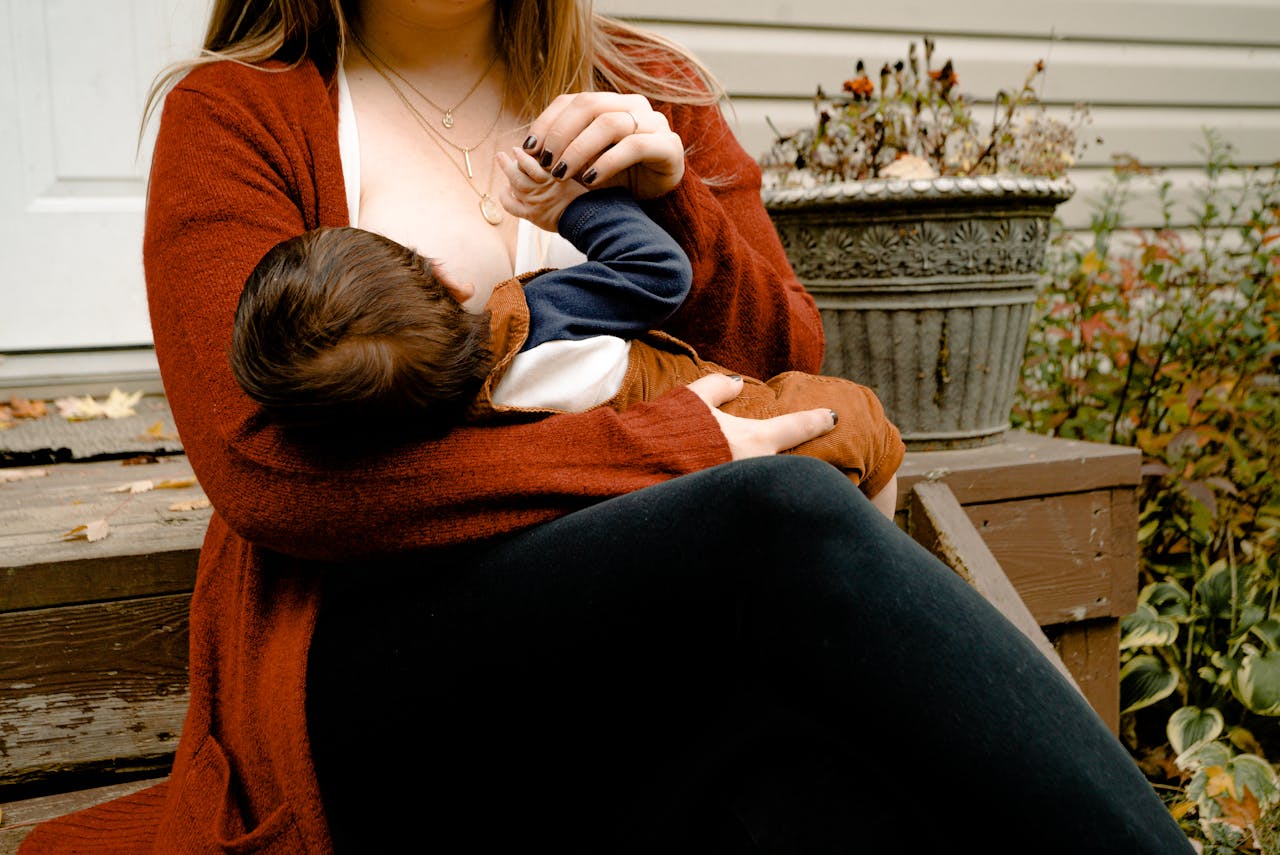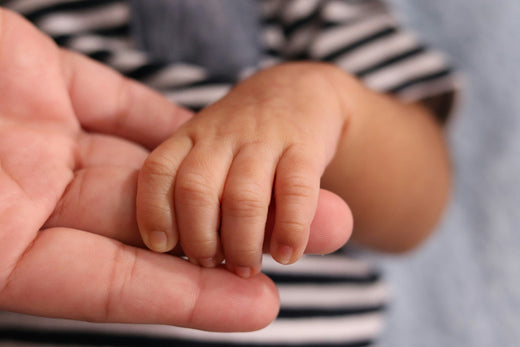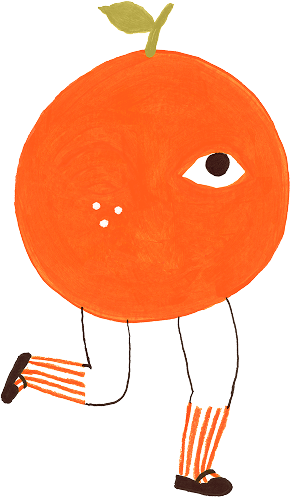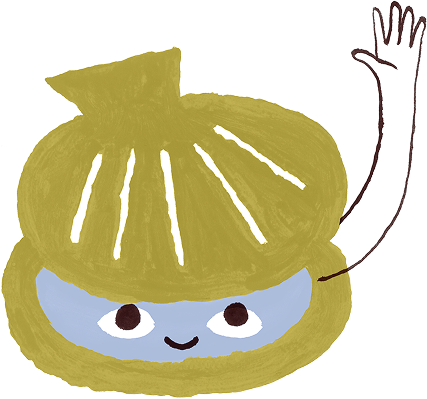Are you wondering when to expect your baby's first tooth? While baby teeth don't come in on a strict schedule, knowing the pattern and general timeline can help. This way, you can support your baby through the teething process and know when to bring up a concern with your pediatrician.
As a breastfeeding mama, I was nervous when my oldest showed signs of teething. His first tooth came right around 6 months, but not without some struggle. Two kids later, I know a lot more about teething, how to provide relief, and when to expect each tooth. Read on to learn everything you need to know about baby teeth.
When Do Babies Get Their First Tooth?
What's normal for baby teeth varies a lot. Most infants have teeth hiding within their gums. At the right time, these teeth push through baby's gums, preparing your baby for eating solids.
While most babies are toothless, others are born with teeth. Here's a general guide to when babies get their first teeth.
Natal Teeth
Dr. Gabriella Dauer, MD, FAAP of Dauer Pediatrics explained in a post that about 1 in 2000 babies are born with teeth. These teeth are "natal teeth." Sometimes, these teeth are super-numerary which means they are extra. Other times, natal teeth are primary teeth that come in early.
Neonatal Teeth
Neonatal teeth are teeth that appear within 30 days of birth. Sometimes, these teeth have similar issues to natal teeth. If you notice that your baby gets neonatal teeth, let your pediatrician know so they can check or refer you to a dentist.
6 - 10 Months: First Teeth
The American Dental Association has a useful teeth eruption chart that details in which order teeth appear. Another helpful resource from the American Academy of Pediatrics details when teeth typically break through the gum.
Usually, babies get their front-bottom teeth first around 6 to 10 months of age. Once baby's first tooth comes in, the rest usually follow in order over several months. Most children have all of their baby teeth by age three.
After the front-bottom teeth, the front-top teeth usually follow. Next are the lateral incisors, next to the front center teeth. Finally, the canines and molars appear.
First Molars
Most babies get their first molars between 14 and 18 months. Often, the bottom molars come in before the top molars. In total, babies and young children have eight molars, four on the bottom and four on top.
2 Year Molars
The back molars come in around 2 years of age. However, some children don't get these until they are nearly 3 years old.

Signs and Symptoms of Teething
How do you know that your baby is teething? As teeth begin to emerge, your baby may have sore gums. Some parents notice when babies start teething and see signs such as:
- Drooling
- Chewing on everything
- Swollen or sore gums
- Irritability
- Having trouble sleeping
- Low interest in feeding or lack of appetite
Researchers have also found that babies may have a slightly elevated body temperature while teething. However, Dr. Dauer reminds parents that a true fever starts at 100.4 F or 38 C and that teething won't cause a true fever.
Infant Teething Relief: Tips and Tricks
When your baby is uncomfortable, there are a few things you can do to help relieve them. Here are some top tips:
- Offer your child a teething toy. Choose safe teething rings made with safe materials.
- Your child can chew on your clean finger. Or, gently rub their gums with your finger.
- Refrigerate a wet washcloth for them to chew on.
- Avoid teething gels with ingredients like benzocaine, the AAP says.
- If your baby seems very uncomfortable, you can try a dose of acetaminophen. Be sure to give the correct dose based on their weight. When in doubt, speak to your pediatrician.
In my experience with my children, offering them something to chew like a teething ring is best. Another great option is a baby spoon. My children often found a spoon easier to grasp than a ring and enjoyed chewing on them.
No matter what your child likes best, be sure to supervise your baby as the mouth and chew.
Common Teething Questions
How Long Does Teething Last?
Teething usually comes in spurts. The discomfort from teething usually only lasts while the tooth is breaking through the gums. Symptoms may last for a few days or weeks and usually subsides after the tooth comes out. However, your baby will gain about 20 teeth within 3 years, which means the whole teething process lasts several years.
How Should I Care for My Baby's Oral Health?
As soon as your baby has a tooth, it's important to start brushing their teeth. Use a tiny smear of fluoridated toothpaste and gently brush your baby's teeth. This will help protect your little one's baby teeth and create good habits for life.
Also, make an appointment to see a dentist when your baby's first tooth comes in or they are 12 months old.
Can Teething Cause Diarrhea?
Experts and researchers agree that teething does not cause diarrhea. If your baby has diarrhea while teething, it's likely another illness. Be sure to check in with your child's pediatrician about this symptom.
Can Teething Cause Fever?
Teething may cause a slightly elevated body temperature, but it won't cause a full-blown fever. A true fever is a body temperature above 100.4 F or 38 C.
Can Teething Cause Runny Nose?
No, teething doesn't cause a runny nose. If your baby has a runny nose while teething, it's likely caused by a virus or illness.
Can Teething Cause Vomiting?
It's unlikely that teething would cause vomiting. While chewing on a toy, your baby may gag if they put the toy too far into their mouth. Choose teething rings that are large enough that your child can't gag on them.
Sources:
1. American Dental Association
2. American Academy of Pediatrics
3. Springer Nature Switzerland AG
4. The American Academy of Pediatrics








Leave a comment
This site is protected by hCaptcha and the hCaptcha Privacy Policy and Terms of Service apply.